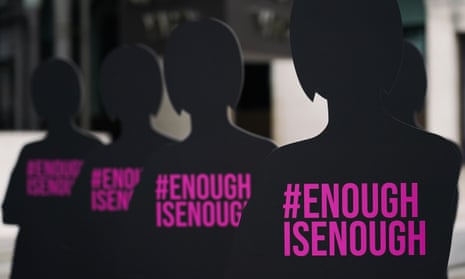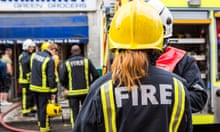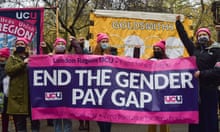More than 10,000 women escaping domestic abuse across England were refused safe housing last year, amid warnings that many could be left homeless or driven back to dangerous partners as a result of a “woeful” lack of safe accommodation.
Official figures seen by the Observer found that almost 8,000 households referred to a safe accommodation service did not receive support because there was no capacity. A further 3,000 were denied places because the shelter “could not meet the needs of the household”, with figures suggesting this was often due to mental health issues, drug and alcohol use or disability.
The concerning figures emerge in the first report by a group set up to monitor progress under landmark laws designed to protect victims of domestic abuse and improve their access to help. Nicole Jacobs, the domestic abuse commissioner for England and Wales, said it was now “vital that service capacity is strengthened”.
Jess Phillips, Labour’s shadow minister for domestic violence, said the figures were “a clear indicator that more needs to be done”, and that legal duties to provide help for those escaping violence were not yet being fulfilled. “The government must produce a clear plan on their response to the amount of victims turned away and clarity on the standards expected of safe accommodation,” she said.
“Sadly too many of those who are being housed are absolutely not in specialist safe, secure, supportive accommodation, but instead in unregulated sometimes dangerous accommodation. The government should not crow about how much they claim to be doing in this space while the data still looks so woeful.”
The figures were published in the first annual progress report from the Domestic Abuse Safe Accommodation National Expert Steering Group, which was set up to monitor how councils are meeting their duties under the Domestic Abuse Act of 2021. While the steering group did not analyse the gender of those who were refused support, 97% of the adults who were able to secure safe housing were women.
The figures for households whose referrals were rejected may include some who later found support elsewhere. However, the figures exclude people who were not referred to safe accommodation in the first place because their council knew there was nowhere available for them.
“Anyone who’s facing domestic abuse and who is not assisted to enter safe accommodation is at such huge risk. The consequences are that they’re exploited and abused on the streets, or they are driven back in an abusive relationship,” said Hannana Siddiqui, head of policy, campaigns and research at the women’s rights group Southall Black Sisters. “If they’re not provided with proper housing and support for themselves and their children, then what choices have they got left? A lot of them are very low income or no income.”
Christine Jardine, Liberal Democrat spokesperson for women and equalities, said: “Women’s aid organisations across the country have been ringing alarm bells for far too long that the government has been failing to provide the vital funding they need. This report highlights the inner failings of the treatment of victims of domestic abuse, and the government should now match their warm words about supporting survivors with the funding for more refuge spaces.”
The report also highlighted a lack of specialist provision for ethnic minority, disabled, LGBTQ+ and male domestic abuse victims, as well as those needing mental health or drug and alcohol support.
There is also a dearth of places that will accept migrants unable to claim state support. Leni Morris, chief executive of the LGBT+ anti-abuse charity Galop, said: “We see LGBT+ victims of abuse having to choose between staying in dangerous abusive situations or risking street homelessness. We often spend days trying to find accommodation for people we work with – sometimes for that person to arrive at that refuge space and face homophobia or transphobia from other residents and have to flee again.”
Sophie Francis-Cansfield, public affairs manager at Women’s Aid, said: “We share concerns about the number of instances highlighted in this report where a survivor is turned away from a service due to capacity. We know it’s not only refuges struggling to keep doors open, but also counselling, resettlement advice and services for children due to the lack of funding for these vital services.”
after newsletter promotion
The progress report said at least 36,545 adults and children were supported in commissioned safe accommodation services, but data issues mean the true figure will be higher. A spokesperson for the Department for Levelling Up, Housing and Communities said: “It is absolutely critical that victims of domestic abuse get support, especially when they are in housing need. The Domestic Abuse Act 2021 placed a duty upon councils to provide safe accommodation, and we have been clear they must consider the specific needs of all victims.
“Since April 2021, we have provided £250m to councils across England to make sure safe accommodation spaces, such as refuges, can provide victims with support services including counselling and therapy, children support and advocacy support to access healthcare, social workers and benefits. We have committed a further £257m in funding for the delivery of these duties over the next two years.”









